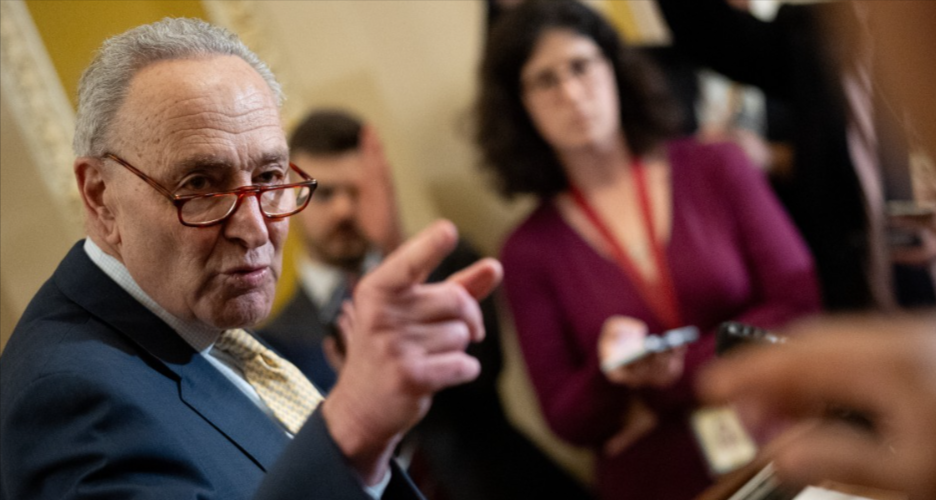Schumer Re-Elected As Senate Democratic Leader

The debate over who will lead the Democratic Party after the election has created divisions within the party nationwide. Despite this, Democrats in the U.S. Senate are largely continuing on their established path.
“I am honored and humbled to be chosen by my colleagues to continue leading Senate Democrats during this crucial period for our country,” Schumer said in a statement. “Republican colleagues should make no mistake about it: we will always stand up for our values. We have a lot of work ahead — in the Senate and as a country — and in this upcoming Congress, our caucus will continue to fight for what’s best for America’s working class.”
According to a Senate Democratic leadership aide, Senate Democrats held a closed-door meeting on Tuesday to elect their leadership team for their return to the minority. This included reelecting Sen. Chuck Schumer for a second term as caucus leader and Sen. Dick Durbin (D-Ill.) as whip, also for a second term.
Two Democrats advanced in leadership, with Sen. Amy Klobuchar (D-Minn.) rising to the third-ranking position as chair of the Steering and Policy Committee. Previously ranked fourth as chair of the Democratic Steering and Outreach Committee, Klobuchar has now taken a step forward.
Additionally, Sen. Cory Booker (D-N.J.), a former 2020 presidential candidate and Senate member since 2013, will head the Strategic Communications Committee.
The aide also noted that all leadership elections were unanimous. While Sen. Kirsten Gillibrand (D-N.Y.) is expected to chair the Democratic Senatorial Campaign Committee, the announcement has not yet been officially made.
“Schumer’s reelection as leader in particular signals trust from rank-and-file Democrats in their current leadership ranks. Despite a brutal November for the party writ large, Senate Democrats did win competitive races in Wisconsin, Michigan, Nevada, and Arizona. They’re still publicly ambitious about their 2026 map and hopeful about their chances to take back the majority,” Politico reported.
“That positivity doesn’t extend party-wide. Multiple Democrats in the House are being challenged for ranking member seats. And Democratic pundits are still locked in a back-and-forth over what went wrong for the party, which lost the House, Senate, and presidency. Schumer himself has acknowledged the party needs to reflect on how it’s connected with voters and assess ways to adjust,” the outlet added.
🚨 Chuck Schumer reelected as Senate Democratic Leader. pic.twitter.com/xlL3y8gDdC
— Martin Walsh (@martinwalsh__) December 3, 2024
Meanwhile, President-elect Donald Trump’s incoming administration is poised to impact judicial appointments. Before Trump takes office, President Joe Biden and the Democratic Party aim to confirm as many judicial nominees as possible, though their efforts face significant hurdles.
Republicans have negotiated a last-minute agreement to allow votes for several district court judges while blocking votes for four appellate court nominees. This compromise ensures that the president-elect will have the opportunity to appoint and confirm four critical appellate judges and potentially dozens more.
A spokesperson for Senate Majority Leader Chuck Schumer told Fox News that the agreement involves trading four circuit nominees, who lack the necessary votes for confirmation, for “more than triple the number of additional judges moving forward.”
“I’m glad that Republican senators are starting to show up to vote because some of the worst nominees are still awaiting confirmation precisely because they didn’t have adequate support,” Judicial Crisis Network President Carrie Severino told Fox News.
“When Trump comes into office, he’s going to have dozens more vacancies to fill,” she added. “And that’s not even counting the judges who will take senior status over the next four years.”
Devon Ombres, CAPAction’s senior director of courts and legal policy, expressed frustration with the situation. “Frankly, I’m at a loss as to why they would get here,” he said. “It would be nice to see Democratic leadership and the White House try and push through and fill those vacancies where possible.”
Ombres predicted that circuit judges, mostly appointed by former President George W. Bush, are likely to take senior status, creating additional vacancies for the incoming president to fill. Judges appointed by former Presidents Bill Clinton and Barack Obama are less likely to step down.
“[Trump will] still have a handful of vacancies that he’ll be able to appoint,” Ombres noted. “However, if Senate Republicans stick to the blue-slip process, it will be more challenging to appoint candidates from blue states. Still, he will have the opportunity to strengthen existing positions, particularly in the 11th Circuit.”
Votes on these judges are expected after the Thanksgiving recess, but the deal does not guarantee smooth confirmations. Republicans are still prepared to push back on nominees.
“I think certainly appellate judges are always going to be more important in our judicial system than district court judges,” Ombres stated. “But district court judges are still capable of instituting nationwide injunctions, striking down programs, and issuing sweeping opinions.”